|
|
|
Sort Order |
|
|
|
Items / Page
|
|
|
|
|
|
|
| Srl | Item |
| 1 |
ID:
138088
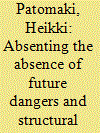

|
|
|
|
|
| Summary/Abstract |
One of the great appeals of securitization theory, and a major reason for its success, has been its usefulness as a tool for empirical research: an analytic framework capable of practical application. However, the development of securitization has raised several criticisms, the most important of which concern the nature of securitization theory. In fact, the appropriate methods, the research puzzles and type of evidence accepted all derive to a great extent from the kind of theory scholars bequeath their faith to. This Forum addresses the following questions: What type of theory (if any) is securitization? How many kinds of theories of securitization do we have? How can the differences between theories of securitization be drawn? What is the status of exceptionalism within securitization theories, and what difference does it make to their understandings of the relationship between security and politics? Finally, if securitization commands that leaders act now before it is too late, what status has temporality therein? Is temporality enabling securitization to absorb risk analysis or does it expose its inherent theoretical limits?
|
|
|
|
|
|
|
|
|
|
|
|
|
|
|
|
| 2 |
ID:
175158
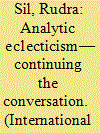

|
|
|
|
|
| Summary/Abstract |
In this response to the contributions in this symposium, I approach the above articles not as wholesale critiques requiring point-by-point rebuttal but as constructive engagements that require clarification or invite further reflection as part of an ongoing conversation. In some instances, I revisit and elaborate upon the main motivations and assumptions that Peter Katzenstein and I had in mind as we sought to lay out the significance of analytic eclecticism for different audiences. At other times, I take it upon myself to consider aspects of our approach that might be updated or reframed in light of concerns raised by some of the authors. I specifically address four issues that have been raised: the core logic of analytic eclecticism and its operationalization with respect to once-dominant paradigms in International Relations; the link between complexity, causality, and constitutive logics; the status of metatheory and the links between eclecticism and pragmatism; and the relationship between scholarly debates and “real-world” issues of policy and ethics. Whether the response is satisfactory or not, it is worth bearing in mind that, for Peter Katzenstein and myself, analytic eclecticism was always meant to be more of an ethos than a method or manifesto; that ethos long predates our published work and is evident in the thoughtful contributions that constitute this symposium.
|
|
|
|
|
|
|
|
|
|
|
|
|
|
|
|
| 3 |
ID:
171238
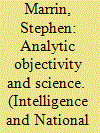

|
|
|
|
|
| Summary/Abstract |
Analytic objectivity as a standard for the US Intelligence Community appears to have been drawn from idealized conceptualizations of the scientific method as a kind of value-neutral epistemological framework used to develop knowledge “objectively.” But this embrace of objectivity provides a poor foundation for contemporary conceptualizations of the applied epistemology of intelligence analysis, as well as performance standards. Instead, intelligence analysts should embrace a more realistic goal of aspiring to but never actually achieving analytic objectivity through the reduction of subjectivity while embracing the values of honesty, neutrality, and integrity encapsulated in the phrase “calling it as you see it”.
|
|
|
|
|
|
|
|
|
|
|
|
|
|
|
|
| 4 |
ID:
139421
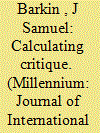

|
|
|
|
|
| Summary/Abstract |
This article suggests to quantitative methodologists that the tools that they use (and often others they do not) are more broadly applicable than is often assumed; to reflexivist researchers that there are many more tools available to their research than are often seen as appropriate; and to the IR discipline writ large that most of the disciplinary thinking about the relationships between research, ontology, epistemology, methodology and methods is unnecessarily narrow. Our core goal is to reveal the problematically inaccurate nature of both the qualitative/quantitative and the positivist/post-positivist divides, as well as of traditional methods training. We suggest that the ability to pair, and the utility of pairing, quantitative (traditionally neopositivist) methods with critical (traditionally non-neopositivist) theorising makes this intervention. To this end, the article begins with discussions of the relationships between epistemology and method in IR research. We continue on to frame a disunity of social science in the quantitative/qualitative divide, which lays the groundwork for a section rethinking traditional understandings of how methods, methodology, and epistemology relate. We then make the case for the utility of methods traditionally classified as ‘quantitative’ for critical research in IR. The article concludes by discussing the transformative implications of this understanding for critical theorising, and for theorising knowledge within disciplinary IR.
|
|
|
|
|
|
|
|
|
|
|
|
|
|
|
|
| 5 |
ID:
161266
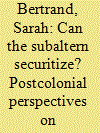

|
|
|
|
|
| Summary/Abstract |
Drawing on postcolonial and feminist writings, this article re-examines securitization theory’s so-called ‘silence-problem’. Securitization theory sets up a definably colonial relationship whereby certain voices cannot be heard, while other voices try to speak for those who are silenced. The article shows that the subaltern cannot securitize, first, because they are structurally excluded from the concept of security through one of three mechanisms: locutionary silencing, illocutionary disablement, or illocutionary frustration. Second, the subaltern cannot securitize because they are always already being securitized and spoken for – as in this case by the well-meaning intellectuals trying to highlight and remediate their predicament. Third, the subaltern cannot securitize because the popular rendering of securitization theory as critical obfuscates and rationalises their marginalisation. This article thus reveals the ‘colonial moment’ in securitization studies, showing how securitization theory is complicit with securitizations ‘for’ that marginalise and silence globally, not just locally outside ‘the West’.
|
|
|
|
|
|
|
|
|
|
|
|
|
|
|
|
| 6 |
ID:
166089


|
|
|
|
|
| Summary/Abstract |
This article discusses the epistemological issues raised by the internationalisation of the social sciences as they affect the case of students from the People’s Republic of China who are trained in social sciences in France and return to pursue their career in higher education and research in China. The aim is to assess whether the epistemological differences between the two academic worlds may give rise to any professional difficulties in this many-sided scientific socialisation. Although our qualitative enquiry has revealed a number of differences, the problem of the availability of professional opportunities does not seem to have a distinctively epistemological dimension.
|
|
|
|
|
|
|
|
|
|
|
|
|
|
|
|
| 7 |
ID:
193006
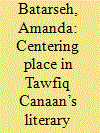

|
|
|
|
|
| Summary/Abstract |
In the early-twentieth century, Palestinian physician and ethnographer Tawfiq Canaan published roughly forty-five studies on the cultural and narrative traditions of the largest section of Palestinian society, the fellaheen (peasantry). In this article, the author examines how Canaan’s expansive collection of stories related to holy sites across Palestine in Mohammedan Saints and Sanctuaries in Palestine (1927) produces a provocative literary cartography—a narrative that operates much like a map. In so doing, she contends that Canaan both contests orientalist constructions of the Holy Land as frozen in biblical time and, critically, unsettles the very spatiotemporal logic governing dominant colonial narrations of place. This epistemic shift, the author concludes, is the result of Canaan’s recentering of Indigenous Palestinian place-based knowledge as both the subject and method of his study. This approach offers instructive lessons applicable within and beyond the disciplinary, regional, and temporal boundaries that have so far circumscribed the study and reception of Canaan’s work.
|
|
|
|
|
|
|
|
|
|
|
|
|
|
|
|
| 8 |
ID:
178895
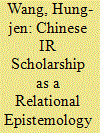

|
|
|
|
|
| Summary/Abstract |
Current anti-Chinese sentiment in the international community has emerged from a knowledge-production background that entails the material fact of China's rising power and ideational factors tied to how the rising China phenomenon is interpreted. The ideational factors can be divided into two groups. One analyses China according to established Western IR theories that describe the country in terms of either threat or opportunity, thereby rendering China as part of an established universal ontology. A second group approaches China's experiences in a more sympathetic light, but still conceptualizes China's rise according to fixed categories such as “nation-state.” This paper argues that both of these groups are guilty of creating self-fulfilling prophecies – that is, they consistently theorize China in opposition to the West owing to the rational epistemology upon which they built their knowledge or perceptions of China. This epistemology conflicts with the efforts of Chinese IR scholars to evaluate China's rise in a relational manner.
|
|
|
|
|
|
|
|
|
|
|
|
|
|
|
|
| 9 |
ID:
103754
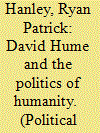

|
|
|
|
|
| Publication |
2011.
|
| Summary/Abstract |
Recently a call has gone up for a revival of the "politics of humanity." But what exactly is the "politics of humanity"? For illumination this paper turns to Hume's analysis of humanity's foundational role in morality and modern politics. Its aims in so doing are twofold. First, it aims to set forth a new understanding of the unity of Hume's practical and epistemological projects in developing his justifications for and the implications of his remarkable and underappreciated claim that humanity is the only sentiment on which a moral system can be founded. Second, by attending to Hume's substantive definition of humanity and its relationship to benevolence and sympathy in particular, it aims to clarify the relationship between the principal elements of the politics of humanity: "humanism" or secularism, "humane" or other-directed values, and mutual recognition of our shared "humanness."
|
|
|
|
|
|
|
|
|
|
|
|
|
|
|
|
| 10 |
ID:
182445
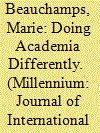

|
|
|
|
|
| Summary/Abstract |
In this article, I explore questions of pedagogy and knowledge-writing practices in their relation to knowledge production. Starting from the observation that different styles of writing are present in our work, but many of them are systematically pushed back and mis-read as non-academic, the article brings to the fore a discussion on the direct relationship between practices of knowledge-writing and those modes of knowing that escape the linear and propositional academic style while still being part of how knowledge comes into being. Following a tradition of intersectional feminist epistemologies, I engage with questions of epistemologies and critical pedagogies, speaking to and with several generations of scholars who address and work with questions of diversity and knowledge production that are seminal within International Relations (IR), yet underexplored from the perspective of knowledge-writing practices.
|
|
|
|
|
|
|
|
|
|
|
|
|
|
|
|
| 11 |
ID:
171495
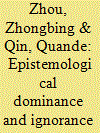

|
|
|
|
|
| Summary/Abstract |
This paper reports on a critical discourse analysis on a collection of international scientific journal articles, which are a critical edge of social epistemology. At the textual surface, the analysis finds that China's shale gas (SG) is compared most frequently with coal and energy imports but rarely with conventional natural gas (CNG) and coalbed methane (CBM), representing a prominent structure of epistemological dominance and ignorance. Situated in this structure there are four prevailing, albeit defective, reasoning forms. The prevalence of those forms suggests that there is a “knowledge deficit” on the comparative advantage of China's SG. This deficit concretely refers to that, the attention paid to the comparative advantage of China's SG toward CNG and CBM, the number of lifecycle-comparisons between energies, and the knowledge about the US shale gas boom, are significantly insufficient. China's energy mix, air quality and energy dependence, the conspicuousness of energy burning, and the nature of human thinking are interwoven factors of this deficit. The epistemological structure and thus the “knowledge deficit” are unfavorable for optimizing China's SG strategy and may delay natural gas' penetration into China's energy mix. This paper, especially its mental model representation, is awareness/introspection provoking to researchers and policy makers.
|
|
|
|
|
|
|
|
|
|
|
|
|
|
|
|
| 12 |
ID:
171788
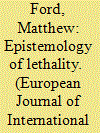

|
|
|
|
|
| Summary/Abstract |
The science of ammunition lethality is a field that seeks to define the point at which military ordnance takes life and produces death. By historicising lethality's epistemology, I reveal the intellectual fissures and scientific uncertainties that have been reified and embedded into contemporary conceptions of military power. This not only tells us something about the processes by which science is subordinated to war, but also offers a new lens from which to consider the way knowledge claims about battle are co-constructed and legitimated through military practices. As a result, this article places science back into a narrative that otherwise frames the ontology of war in terms of fighting.
|
|
|
|
|
|
|
|
|
|
|
|
|
|
|
|
| 13 |
ID:
073423
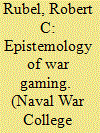

|
|
|
| 14 |
ID:
138085
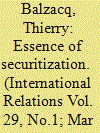

|
|
|
|
|
| Summary/Abstract |
One of the great appeals of securitization theory, and a major reason for its success, has been its usefulness as a tool for empirical research: an analytic framework capable of practical application. However, the development of securitization has raised several criticisms, the most important of which concern the nature of securitization theory. In fact, the appropriate methods, the research puzzles and type of evidence accepted all derive to a great extent from the kind of theory scholars bequeath their faith to. This Forum addresses the following questions: What type of theory (if any) is securitization? How many kinds of theories of securitization do we have? How can the differences between theories of securitization be drawn? What is the status of exceptionalism within securitization theories, and what difference does it make to their understandings of the relationship between security and politics? Finally, if securitization commands that leaders act now before it is too late, what status has temporality therein? Is temporality enabling securitization to absorb risk analysis or does it expose its inherent theoretical limits?
|
|
|
|
|
|
|
|
|
|
|
|
|
|
|
|
| 15 |
ID:
186670
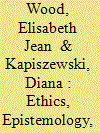

|
|
|
|
|
| Summary/Abstract |
The political science discipline has recently engaged in contentious debate about the value of “research transparency,” particularly for research with human participants. The discipline is also holding vital conversations about research ethics and is rekindling dialogue about different ways of knowing. We offer an integrated account of how the actions that scholars who conduct human participant research take to respect ethical principles (which vary by research substance and settings), and their epistemological commitments (which vary across researchers), influence openness, a broader concept than “transparency.” These principles and commitments shape scholars’ openness practices simultaneously—both independently and in concert—serving as a prism through which multiple features of a research project are refracted, and resulting in a scholar’s inclination and ability to pursue openness in different ways and to different degrees with the audiences of her work. We also show how ethical principles and epistemological commitments can not only constrain and prevent openness, but also animate and require it. We suggest that scholars pursuing openness ethically, and in ways that honor their epistemological commitments, represents good social science, and we offer strategies for doing so. To develop our argument, we focus primarily on two research methods, ethnography and interviews, and on openness toward two audiences, human participants and research communities. Our account illuminates how the heterogeneity of human participant research makes it inappropriate, indeed impossible, to develop blanket rules for pursuing openness. Throughout, we highlight the importance of reflexivity for the ethical conduct of, and for being ethically open about, political science research.
|
|
|
|
|
|
|
|
|
|
|
|
|
|
|
|
| 16 |
ID:
178138
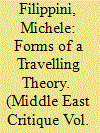

|
|
|
|
|
| Summary/Abstract |
Since 2000, Gramscian concepts have been undergoing an unprecedented process of dissemination, and this process has occurred along two specific axes: The geographic axis and the disciplinary axis. This process, which is also a hybridization resulting in political innovation, often has been interpreted in terms of fidelity/infidelity to Gramsci’s ideas, and as a result has been interpreted as somewhat of a degenerative process. In contrast, my analysis focuses on the transit of Gramscian theory, that is, on what ideas transit, on how they transit, and why they transit rather than starting with a presupposed ‘original’ theory or the arrival points of ‘corrupted’ or ‘translated’ theory. By looking beyond an essentialist notion of his theory, this inquiry into Gramscian concepts ends up discussing the problems of contemporary history and politics rather than simply the revival of interest in a Sardinian Marxist.
|
|
|
|
|
|
|
|
|
|
|
|
|
|
|
|
| 17 |
ID:
083580
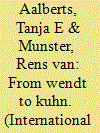

|
|
|
|
|
| Publication |
2008.
|
| Summary/Abstract |
Constructivism is often identified as the legitimate occupant of the middle ground between rationalism and reflectivism that emerged from the Third Debate in international relations (IR) theory. Indeed, the rationalist-constructivist debate is already being framed as the next dominant debate with the IR community. This paper evaluates the bridge-building project as initiated by Alexander Wendt, and takes issue with the via media as proposed by the so-called conventional constructivists. It is claimed that the rationalist-constructivist debate has been limited to a discussion of ontology, which has brought about a contradiction between ontology and epistemology. Returning to the pressing epistemological issues that were put on the table by reflectivist scholars, this article refocuses the current debate by taking up the Kuhnian link between substance and science. It elaborates a view of science as a communal practice built on intersubjective conventions and argumentative procedures. This leads to an alternative conception of the middle ground as a communicative space.
|
|
|
|
|
|
|
|
|
|
|
|
|
|
|
|
| 18 |
ID:
112395
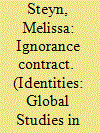

|
|
|
|
|
| Publication |
2012.
|
| Summary/Abstract |
Working with the recollections of everyday experiences of apartheid collected by the Apartheid Archives project, and drawing on the emerging theorization of ignorance in the critical philosophy of race, this article explores how an 'ignorance contract' - the tacit agreement to entertain ignorance - lies at the heart of a society structured in racial hierarchy. Unlike the conventional theorization of ignorance that regards ignorance as a matter of faulty individual cognition, or a collective absence of yet-to-be-acquired knowledge, ignorance is understood as a social achievement with strategic value. The apartheid narratives illustrate that for ignorance to function as social regulation, subjectivities must be formed that are appropriate performers of ignorance, disciplined in cognition, affect and ethics. Both white and black South Africans produced epistemologies of ignorance, although the terms of the contract were set by white society as the group with the dominant power.
|
|
|
|
|
|
|
|
|
|
|
|
|
|
|
|
| 19 |
ID:
110586
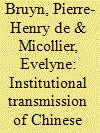

|
|
|
|
|
| Publication |
2011.
|
| Summary/Abstract |
The aim of this article is to propose a typology of the different issues that the transmission of traditional Chinese medicine encounters today in the world, by successively highlighting ideological, epistemological, political, and educational difficulties. After showing how much the polarised aspect of the debates on Chinese medicine is already entrenched among specialists in this discipline, we explore the question of the epistemological status of this Chinese tradition by confronting it with the dominant biomedicine of Western origin. The originality of Chinese structures that were set up to protect and promote this national tradition is then highlighted as a possible source of inspiration at the international level, before describing the different economic factors likely to play a positive or negative role in the development of this medical and cultural heritage at the local level. Finally, the specific didactic questions that the transmission of this heritage and the teaching of this discipline raise are analysed before presenting a conclusion.
|
|
|
|
|
|
|
|
|
|
|
|
|
|
|
|
| 20 |
ID:
138084
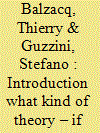

|
|
|
|
|
| Summary/Abstract |
One of the great appeals of securitization theory, and a major reason for its success, has been its usefulness as a tool for empirical research: an analytic framework capable of practical application. However, the development of securitization has raised several criticisms, the most important of which concern the nature of securitization theory. In fact, the appropriate methods, the research puzzles and type of evidence accepted all derive to a great extent from the kind of theory scholars bequeath their faith to. This Forum addresses the following questions: What type of theory (if any) is securitization? How many kinds of theories of securitization do we have? How can the differences between theories of securitization be drawn? What is the status of exceptionalism within securitization theories, and what difference does it make to their understandings of the relationship between security and politics? Finally, if securitization commands that leaders act now before it is too late, what status has temporality therein? Is temporality enabling securitization to absorb risk analysis or does it expose its inherent theoretical limits?
|
|
|
|
|
|
|
|
|
|
|
|
|
|
|
|
|
|
|
|
|